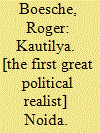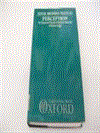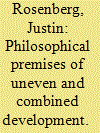| Srl | Item |
| 1 |
ID:
159700


|
|
|
|
|
| Publication |
Noida, HarperCollins Publishers, 2017.
|
| Description |
xii, 127p.pbk
|
| Standard Number |
9789352645817
|
|
|
|
|
|
|
|
|
|
|
|
Copies: C:1/I:0,R:0,Q:0
Circulation
| Accession# | Call# | Current Location | Status | Policy | Location |
| 059413 | 808.4/BOE 059413 | Main | On Shelf | General | |
|
|
|
|
| 2 |
ID:
132239


|
|
|
|
|
| Publication |
Oxford, Clarendon Press, 1986.
|
| Description |
xv, 438p.Hbk
|
| Contents |
B
|
| Standard Number |
0198246250
|
|
|
|
|
|
|
|
|
|
|
|
Copies: C:1/I:0,R:0,Q:0
Circulation
| Accession# | Call# | Current Location | Status | Policy | Location |
| 057798 | 181.43/MAT 057798 | Main | On Shelf | General | |
|
|
|
|
| 3 |
ID:
120474


|
|
|
|
|
| Publication |
2013.
|
| Summary/Abstract |
Recent debates over Leon Trotsky's idea of 'uneven and combined development' (U&CD) have focused on its potential in the field of International Relations, but they have not established the source of this potential. Does it derive from the philosophical premises of dialectics? The present article argues that the idea of U&CD in fact involves an innovation as fundamental for Marxist dialectics as for other branches of social theory. And it also argues that in formulating this innovation, Trotsky provided a general solution to some of the most basic problems in social and international thought. The argument is set out in three parts. The first part reconstructs Trotsky's own account of dialectical premises and their implications for social explanation. The second shows how the concept of U&CD departs from this, in ways that presuppose the tacit addition of a further ontological premise. Finally, part three analyses the locus classicus of the concept - the opening chapter of Trotsky's History of the Russian Revolution - showing how it is this additional premise which underpins the central achievement of the idea: its incorporation of 'the international' into a theory of history.
|
|
|
|
|
|
|
|
|
|
|
|
|
|
|
|